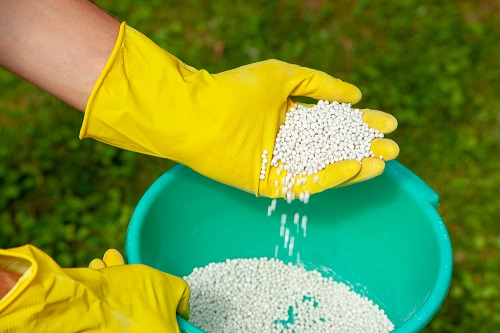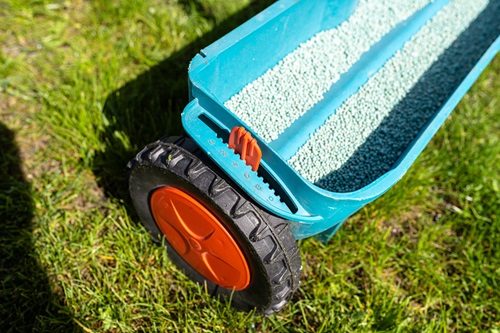
Finding the right lawn fertilizer can seem like navigating a maze of numbers and jargon. However, fear not! This straightforward guide will help you make sense of it all. From decoding the mysterious NPK ratio to deciding between granular and liquid options, this lawn care guide has you covered.
We’ll also explore the choices between synthetic and organic fertilizers, delve into specialty fertilizers, and outline when and how to apply them.
And if you’re looking for easy-to-follow recommendations, we’ve even included our top picks for the best lawn fertilizers.
Lawn Care: All About Fertilizers
Cracking the Code of Lawn Fertilizer Numbers
Each bag of lawn fertilizer displays three numbers like 10-10-10, 32-0-10, or 16-4-8. These numbers are known as the NPK ratio and hold the secret to selecting the most appropriate fertilizer for the lawn.
NPK stands for nitrogen (N), phosphorus (P), and potassium (K) – the three vital nutrients your grass needs. The numbers in the ratio tell you the percentage of each nutrient in the fertilizer. For instance, a 10-10-10 fertilizer contains 10% nitrogen, 10% phosphorus, and 10% potassium.
To figure out how much of each nutrient is in a bag of fertilizer, multiply the percentages by the bag’s weight.
Each nutrient serves a unique purpose:
- Nitrogen spurs rapid growth and imparts a lush, green appearance.
- Phosphorus supports robust root development.
- Potassium enhances resistance to diseases and overall plant health.
So, if you want your lawn to grow quickly and flaunt a vibrant green, choose a fertilizer with a high nitrogen content. If you’re unsure about the right ratio, consider a soil test to uncover which nutrients your soil lacks.
Choosing Between Granular and Liquid Fertilizer
The choice between granular and liquid fertilizer boils down to personal preference, with each having its own advantages:
Granular Fertilizer
Granular fertilizers consist of tiny particles spread across your lawn using a fertilizer spreader. No need to mix with water. Most granular options are “slow-release fertilizers,” gradually providing nutrients to prevent over-fertilization.
Liquid Fertilizer
Liquid fertilizers come in various forms, including ready-to-spray bottles that attach to your garden hose, concentrated liquids you dilute before spraying, and water-soluble particles that transform into liquid when mixed with water.
Synthetic vs. Organic Lawn Fertilizer
For those concerned about the environment or pet safety, the choice between synthetic and organic lawn fertilizer becomes essential:
Synthetic Lawn Fertilizer
Synthetic fertilizers employ man-made chemicals for nutrient delivery. They offer potency and effectiveness.
Organic fertilizers use natural materials like manure, compost, bone meal, or seaweed to enrich your soil. They are eco-friendly and pet-safe.
Specialty Lawn Fertilizers
Certain lawns have distinct needs that standard fertilizers cannot address. Here are some specialized options:
Fertilizers for New Lawns
If you’ve recently sown grass seed or installed new sod, opt for a lawn starter fertilizer. Specifically designed for new grass, it emphasizes robust root development and minimizes nitrogen to prevent burning.
Weed-and-Feed Fertilizers
Many fertilizers include herbicides for weed control. Pre-emergent weed-and-feed fertilizers thwart common summer weeds like crabgrass, while post-emergent variants tackle existing weeds.
Seasonal Lawn Fertilizers
Certain fertilizers are formulated for specific times of the year. Ensure you select the appropriate product for each season to maintain a healthy and thriving lawn.
After selecting the right lawn fertilizer, it’s time to put it to use. The timing depends on your grass type. Once the fertilizer has worked its magic, your lawn will grow faster than ever. This means more frequent mowing, but it doesn’t have to consume your entire weekend.
Call Conner’s Lawn Care Service now if you need help in taking care of your lawn.
Conner’s Lawn Care Service
Myrtle Beach, SC
843-504-4901
http://connerslawncare.com/


No comments:
Post a Comment